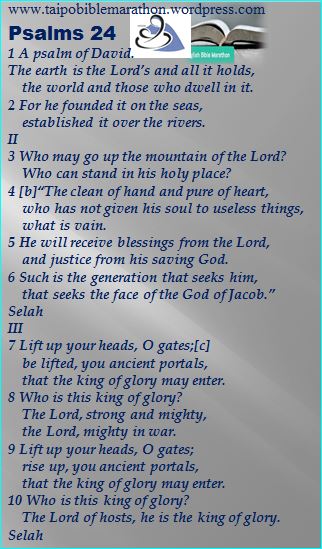Psalm 26 (Bible Marathon Day 280)
Psalm 26[a]
Prayer of Innocence
1 Of David.
I
Judge me, Lord!
For I have walked in my integrity.
In the Lord I trust;
I do not falter.
2 Examine me, Lord, and test me;
search my heart and mind.
3 Your mercy is before my eyes;
I walk guided by your faithfulness.
II
4 I do not sit with worthless men,
nor with hypocrites do I mingle.
5 I hate an evil assembly;
with the wicked I do not sit.
6 I will wash my hands[b] in innocence
so that I may process around your altar, Lord,
7 To hear the sound of thanksgiving,
and recount all your wondrous deeds.
8 Lord, I love the refuge of your house,
the site of the dwelling-place of your glory.
III
9 Do not take me away with sinners,
nor my life with the men of blood,
10 In whose hands there is a plot,
their right hands full of bribery.
11 But I walk in my integrity;
redeem me, be gracious to me!
12 My foot stands on level ground;[c]
in assemblies I will bless the Lord.
Footnotes:
Psalm 26 Like a priest washing before approaching the altar (Ex 30:17–21), the
psalmist seeks God’s protection upon entering the Temple. Ps 26:1–3, matched by Ps
26:11–12, remind God of past integrity while asking for purification; Ps 26:4–5, matched
by Ps 26:9–10, pray for inclusion among the just; Ps 26:6–8, the center of the poem,
express the joy in God at the heart of all ritual.
26:6 I will wash my hands: the washing of hands was a liturgical act (Ex 30:19, 21;
40:31–32), symbolic of inner as well as outer cleanness, cf. Is 1:16.
26:12 On level ground: in safety, where there is no danger of tripping and falling. In
assemblies: at the Temple. Having walked around the altar, the symbol of God’s
presence, the psalmist blesses God.



